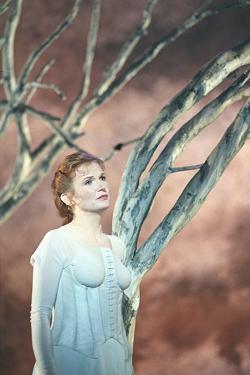|
<< -- 2 -- Roderic Dunnett UNALLOYED GENIUS

As German soprano Anne Schwanewilms -- who sings and acts the title role
stunningly -- points out, Euryanthe is probably a girl in her middle teens
: she herself (quite some achievement, but Schwanewilms is a thinking actress
of the front rank and will sing Chrysothemis in Elektra for Christoph
von Dohnanyi, making her Covent Garden débute, next March) actually
contrives to appear a teenager herself. Certainly the ill-used heroine is
psychologically immature, having been brought up in the near-Islamic protectiveness
of a medieval European household, and then had responsibility thrust on
her at a younger age than Edward III.

Anne Schwanewilms as the abandoned Euryanthe in Act 3 of Weber's opera. Photo: Mike Hoban
|
That this young girl on the cusp of an (apparently unarranged) marriage,
then suddenly spurned by her heroic fiancé (Adolar) for a supposed
affair with a rival of which Adolar thinks he has conclusive proof, fails
to explain her dilemma to her detractors (Adolar has mistaken a disclosed
secret for the breaching of her girdle, and the disgust is taken up by the
mainly male chorus) is in fact little surprise : as Jones's production
visibly underlines, not only is she not even given the chance to;
the childish Euryanthe is more obsessed with what she sees as her genuine
wrongdoing : her betrayal of a guilty secret (she has revealed the truth
about of Adolar's lovesick sister, who has committed suicide -- a stain
on the entire family, totally unmentionable in those days) than with Adolar's
idiotic imputation of a never-committed indecency. What's more, the
real villain of the piece, her sinuous confidante Eglantine (a role
the late Rita Hunter excellently makes her own on Janowski's EMI recording),
binds her to silence, winding her round like an ugly spider. No wonder the
girl is terrified. Never mind the men : women, beware women.
This dualism of good pair-bad pair (Euryanthe-Adolar, Eglantine-Lysiart;
there are also shades of the Caspar-Max dualism of Der Freischütz),
a case of love-made-good versus love-turned-bad, each impinging -- with different
results for the plot -- on the other, play an important role in Euryanthe
(as indeed in Lohengrin); as in Freischütz, the balance
is maintained, narrowly, by authority (in Freischütz by Otokar
and the Hermit; here by bass Clive Bayley, in particularly good voice, as
the King). Jones and his immensely effective designer, John Macfarlane,
achieve this in different ways. The men -- a set of Ukrainian heavies, for
coincidentally both the superb Pavlo Hunka (the villain Lysiart) and his
beefily energetic rival, John Daszak, spring from part-Ukrainian stock --
are clad, like the set itself, in a kind of cement-coloured grey-beige as
if (so far from the familiar chivalric pictures in gaudy pre-Raphaelite
hues) their world is lifeless, sterile without the women they visibly oppress.
It's as if the whole society was fashioned of the same grim, unyielding
stone as the Commendatore's statue.
Continue >>
Copyright © 28 July 2002
Roderic Dunnett, Coventry, UK
 RODERIC DUNNETT ON THE RESIGNATION OF NICHOLAS PAYNE
GLYNDEBOURNE FESTIVAL AND GLYNDEBOURNE TOURING OPERA WEBSITE
RODERIC DUNNETT ON THE RESIGNATION OF NICHOLAS PAYNE
GLYNDEBOURNE FESTIVAL AND GLYNDEBOURNE TOURING OPERA WEBSITE
|

